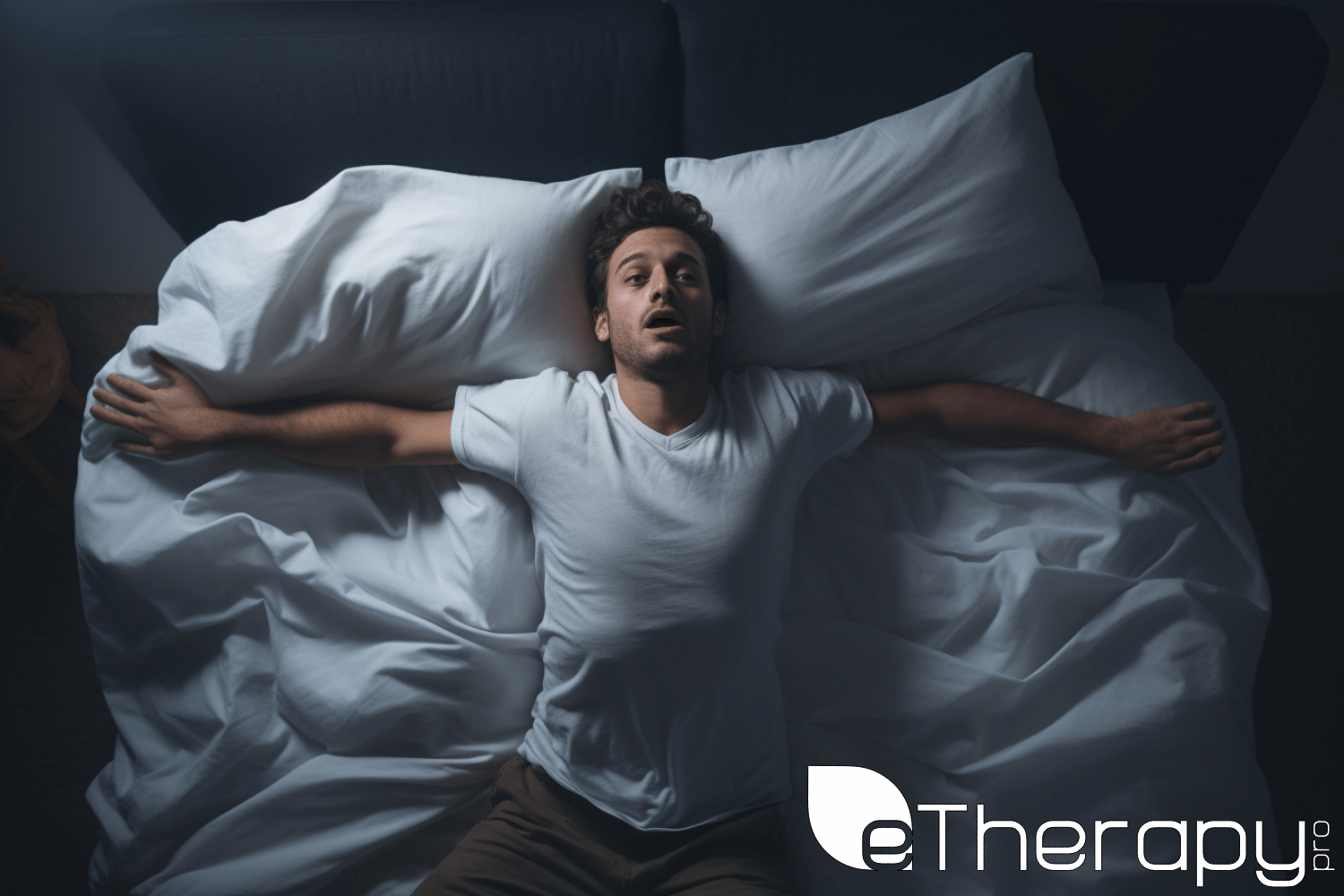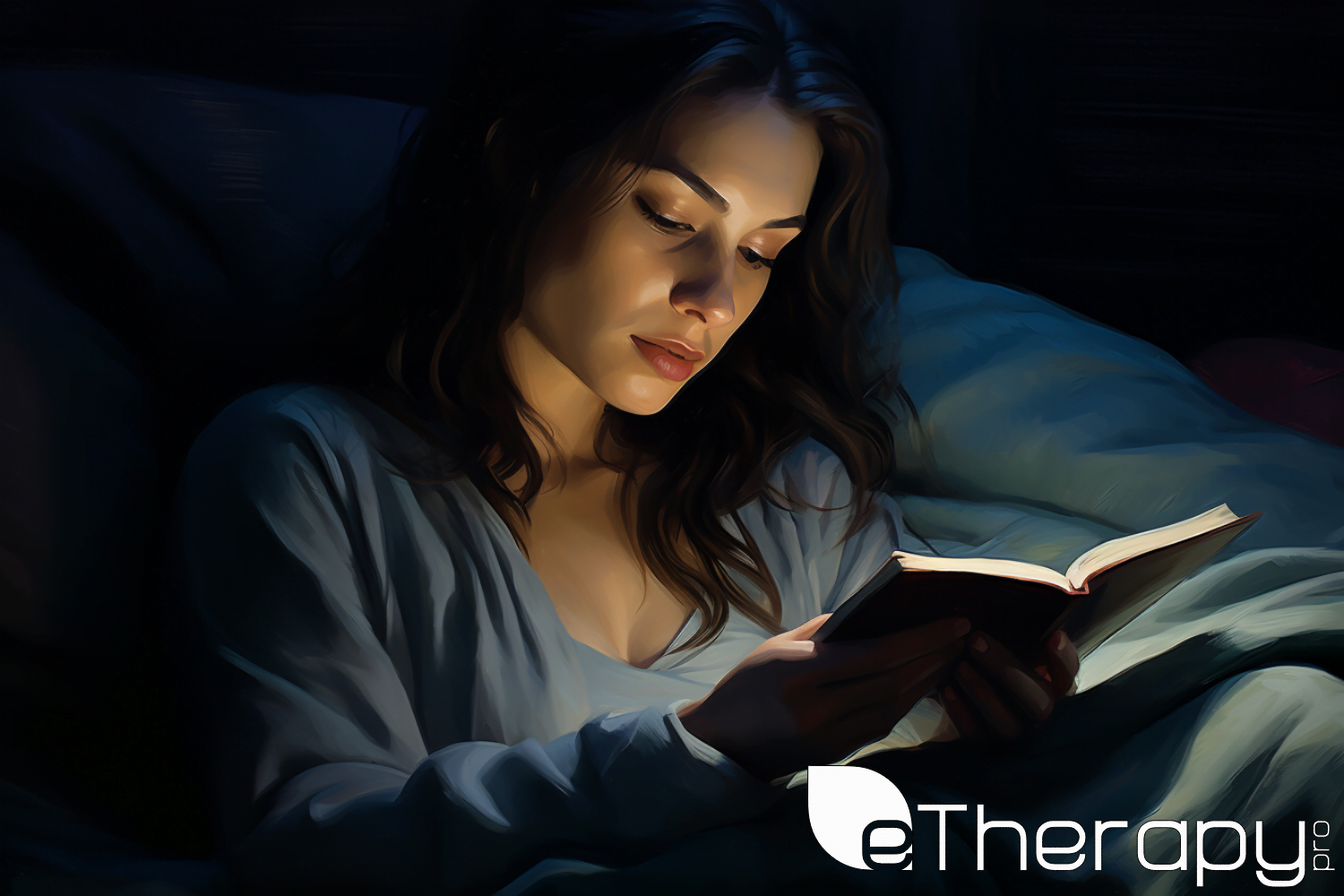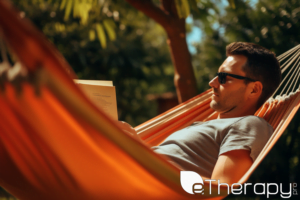 Have you ever found yourself staring at the ceiling, long after the world has fallen asleep, wondering, “Why can’t I sleep at night?” If so, you’re not alone. Insomnia, a sleep disorder where individuals have trouble falling or staying asleep, affects countless lives. It’s a nighttime challenge that turns into a daytime ordeal, impacting everything from our mood to our health.
Have you ever found yourself staring at the ceiling, long after the world has fallen asleep, wondering, “Why can’t I sleep at night?” If so, you’re not alone. Insomnia, a sleep disorder where individuals have trouble falling or staying asleep, affects countless lives. It’s a nighttime challenge that turns into a daytime ordeal, impacting everything from our mood to our health.
Insomnia is more than just an individual concern; it’s a societal issue. Studies show that up to one-third of the adult population experiences symptoms of insomnia, with its prevalence varying across different age groups. While often associated with older adults, insomnia is not exclusive to any age group. It’s found in busy professionals struggling to balance work and life, in teenagers grappling with hormonal changes and social pressures, and even in children exposed to excessive screen time.
But what exactly is insomnia? Is it just the occasional sleepless night, or is it something more? This article will guide you through the mysterious world of insomnia. We’ll explore its causes, delve into its impact on health, and uncover both medical and natural ways to combat it. From understanding the role of Cognitive Behavioral Therapy (CBT) in treating insomnia to demystifying common questions like “Can sleep disorders be cured?” we will leave no stone unturned.
Our journey will also take us through the realms of natural sleep remedies and the importance of sleep hygiene. With a mix of scientific insights and practical tips, this article aims to be your companion in the quest for a good night’s sleep. So, let’s embark on this journey together, to understand why we can’t sleep at night, and more importantly, what we can do about it.
Understanding Insomnia
Insomnia is a common yet often misunderstood condition that affects many. In this section, we delve into what insomnia truly is and explore its various causes.
What is Insomnia?
Insomnia isn’t just about having trouble falling asleep; it’s a complex condition that affects how and when we sleep. It manifests in different ways, such as difficulty falling asleep, staying asleep, or waking up too early and not being able to fall back asleep. Physiologically, insomnia disrupts the normal sleep cycle, impacting both REM (rapid eye movement) and non-REM sleep stages, which are critical for cognitive functions like memory consolidation and mood regulation.
There are two main types of insomnia: acute and chronic. Acute insomnia is short-term, often triggered by life events such as stress at work, family pressures, or significant changes in one’s environment. It usually resolves without treatment. Chronic insomnia, on the other hand, lasts for a longer period, often for months or more. It can deeply impact health and well-being, leading to issues such as cognitive impairment, mood disturbances, and increased risk of chronic health conditions.
Insomnia is a vertiginous lucidity that can convert paradise itself into a place of torture. – Emil Cioran, Philosopher and Essayist.
Causes of Insomnia
Several factors can lead to insomnia, ranging from psychological stress to lifestyle habits. Identifying these causes is a crucial step in addressing the condition.
Psychological Stress:
Stressors like job pressure, family issues, or significant life changes can disrupt normal sleep patterns, leading to a hyperarousal state that impedes sleep. Chronic stress can activate the body’s “fight or flight” response, releasing stress hormones that make it challenging to relax and fall asleep. This heightened state of alertness can persist even during bedtime, making it difficult to transition into restful sleep.
Mental Health Disorders:
Conditions such as anxiety, depression, and bipolar disorder often have a bidirectional relationship with insomnia, each exacerbating the other. Insomnia can be both a symptom and a trigger for these disorders. For example, individuals with depression may experience insomnia, and conversely, chronic insomnia can increase the risk of developing mood disorders.
Physical Conditions
Chronic pain, asthma, or digestive problems not only make it difficult to sleep but also disrupt the sleep architecture, reducing the restorative stages of sleep. Pain conditions can lead to nighttime awakenings and frequent shifts between sleep stages, preventing the individual from reaching deep, restorative sleep. Similarly, conditions like asthma can cause nighttime symptoms, while digestive issues can lead to discomfort and awakenings during the night.
Environmental Factors:
Factors like noise, light, or an uncomfortable bed can significantly affect sleep quality by disrupting the body’s natural sleep rhythm. An overly noisy or brightly lit sleep environment can prevent the brain from entering the deeper stages of sleep. Additionally, an uncomfortable mattress or pillow can lead to discomfort and frequent awakenings.
Lifestyle Choices:
Habits such as irregular sleeping schedules, excessive caffeine intake, and screen time before bed can disturb the body’s internal clock, leading to difficulty initiating and maintaining sleep. Irregular sleep patterns can confuse the body’s internal circadian rhythm, making it challenging to fall asleep at the desired bedtime. Likewise, caffeine, particularly when consumed in the afternoon or evening, can stimulate the nervous system, hindering the ability to relax and sleep. Screen time before bed exposes individuals to blue light, which can suppress the production of melatonin, a hormone that regulates sleep-wake cycles.
Understanding the diverse causes of insomnia aids in tailoring effective treatment and management strategies. In the following sections, we’ll explore the health impacts of this condition and the various diagnostic and therapeutic approaches.
 The Health Impact of Insomnia
The Health Impact of Insomnia
Insomnia does more than just leave you feeling tired; its effects on both physical and mental health are profound and far-reaching. Let’s explore these impacts in greater detail, understanding how they manifest in both the short and long term.
Short-Term and Long-Term Effects
The consequences of insomnia can be immediate and accumulate over time, affecting various aspects of health:
- Immediate Impacts on Mood and Performance: Lack of sleep can lead to irritability, mood swings, and difficulty concentrating. This emotional volatility can strain personal relationships and decrease productivity at work or school. It also affects cognitive functions, leading to poor decision-making and reduced creativity.
- Weakened Immune System: Even short-term sleep deprivation can compromise the body’s immune response. This weakened state makes you more susceptible to common illnesses like colds and the flu and can prolong recovery times from various infections.
- Increased Risk of Accidents: Insomnia-induced fatigue impairs reflexes and decision-making capabilities. This impairment is particularly dangerous when it comes to activities that require constant alertness, such as driving, where drowsiness can significantly increase the risk of accidents.
- Long-Term Mental Health Issues: Chronic insomnia is a key risk factor for the development of serious mental health conditions, including anxiety disorders and depression. It exacerbates the symptoms of existing mental health issues, creating a vicious cycle of sleeplessness and psychological distress.
- Weight Gain and Metabolic Issues: Insomnia disrupts hormones that regulate appetite, leading to increased hunger and cravings for high-calorie, carbohydrate-rich foods. This disruption can lead to weight gain and an increased risk of metabolic disorders like diabetes.
- Cardiovascular Health: Over time, chronic insomnia can lead to elevated stress hormones and increased inflammation in the body, both of which are risk factors for heart disease and hypertension.
- Cognitive Decline: Long-term sleep deprivation can lead to a decline in cognitive functions like memory, attention, and problem-solving skills. In older adults, prolonged insomnia is associated with an increased risk of developing neurodegenerative diseases like Alzheimer’s..
Sleep is the golden chain that ties health and our bodies together. – Thomas Dekker, Elizabethan Playwrighter
The Importance of Addressing Insomnia
Understanding the extensive impacts of insomnia on health underlines the critical importance of addressing this sleep disorder. Effective management and treatment are not just about improving night-time rest but are essential for maintaining overall health and well-being. The forthcoming sections will explore how insomnia can be diagnosed and the various approaches to its treatment.
Diagnosing Insomnia
Recognizing when to seek help and understanding the diagnostic process are crucial steps in addressing insomnia. This section outlines when to consult a doctor and the methods they might use to diagnose insomnia.
When to See a Doctor
It can be challenging to determine when it’s time to see a doctor for sleep problems. Here are some criteria and recommendations:
- Persistency and Severity: If you’ve been experiencing sleep problems for more than three weeks and they’re significantly affecting your daily life, it’s time to consult a healthcare professional.
- Daytime Dysfunction: If insomnia is causing fatigue, concentration problems, mood disturbances, or decreased performance at work or school, seek medical advice.
- Underlying Health Concerns: If you suspect your sleep problems might be linked to other health issues, such as depression or chronic pain, a doctor’s evaluation is important.
Diagnostic Methods
Doctors use various methods to diagnose insomnia, aiming to understand its causes and severity. Some common diagnostic tools include:
- Medical History Review: This involves discussing your sleep habits, health history, and lifestyle.
- Sleep Diary: Keeping a record of your sleep patterns over a couple of weeks can provide valuable insights into your sleep habits.
- Physical Examination: Sometimes, physical health problems can contribute to insomnia, so a general physical check-up might be necessary.
- Psychological Screening: This helps identify any mental health issues like depression or anxiety that might be affecting your sleep.
- Sleep Studies: Doctors may recommend a sleep study, known as polysomnography, to monitor sleep patterns and behaviors, especially when sleep apnea is suspected.
Understanding how insomnia is diagnosed paves the way for effective treatment. With the right diagnosis, tailored treatments can be more efficiently implemented. The next sections of the article will explore various treatment options, including CBT for insomnia, and natural remedies.

Therapeutic Approaches
When it comes to managing insomnia, a combination of psychological and physical strategies can be particularly effective. This section delves deeper into the nuances of Cognitive Behavioral Therapy for Insomnia (CBT-I) and the crucial role of exercise in combating this sleep disorder.
CBT for Insomnia
Cognitive Behavioral Therapy for Insomnia, or CBT-I, is a specialized, non-pharmacological treatment designed to address insomnia’s root causes. It involves a series of components, each tailored to tackle specific aspects of sleep disturbance:
-
Stimulus Control Therapy: focuses on forming a strong psychological association between the bed and sleep. For instance, patients are encouraged to establish a consistent bedtime routine and to use the bed only for sleep-related. The idea is to train the brain to associate the bed with sleepiness, not wakefulness or stress.
- Sleep Restriction: This technique limits the time spent in bed to the actual sleep time, creating mild sleep deprivation, which in turn increases sleep drive. The approach is to methodically increase the sleep window as sleep efficiency improves, often leading to more consolidated and restful sleep over time.
- Relaxation Techniques: Patients learn various relaxation methods to help calm the mind and body. This includes deep breathing exercises, guided imagery, and meditation, all aimed at reducing the physiological arousal that can hinder sleep.
- Sleep Hygiene Education: This component emphasizes the importance of creating an optimal sleep environment and adopting conducive lifestyle habits. It involves advice on light exposure, dietary habits, and bedroom environment adjustments to foster better sleep.
- Cognitive Therapy: Central to CBT-I, this aspect involves addressing and restructuring negative thoughts and worries about sleep. For example, a therapist might work with a patient to alter stress-inducing beliefs like “I’ll never get a good night’s sleep” to more positive and realistic ones.
For those seeking support through online therapy, platforms like eTherapyPro can provide access to professionals skilled in CBT-I. eTherapyPro offers a convenient way to connect with therapists who can guide patients through these strategies, making it a valuable resource for individuals struggling with insomnia.
The Role of Exercise in Managing Insomnia
Physical exercise is a cornerstone in managing insomnia, offering both direct and indirect benefits for sleep quality. Engaging in regular physical activity can transform the way our body responds to stress, one of the primary culprits of sleepless nights. Exercise not only helps in physically tiring out the body, making it easier to fall asleep, but it also contributes to mental well-being, reducing anxiety and depressive symptoms that often accompany insomnia. This dual impact on both the mind and body makes exercise an integral part of any comprehensive approach to tackling insomnia.
- Reduces Stress and Anxiety: Exercise is a natural stress reliever. Activities like jogging, yoga, or even walking can lower stress hormone levels in the body, creating a more conducive state for sleep.
- Improves Sleep Quality: Regular physical activity can increase the amount of deep sleep you get. Deep sleep is the most restorative phase of sleep, helping improve brain function and mood.
- Regulates Sleep Patterns: Exercising can help reset the sleep-wake cycle, particularly if done in daylight. Natural light exposure and physical activity work together to regulate your body’s internal clock.
- Reduces the Risk of Sleep Disorders: Regular exercise can reduce the risk of developing sleep disorders, such as sleep apnea, which can interfere with sleep quality.
- Promotes Physical Exhaustion: Physical activity can lead to a healthy form of tiredness, making it easier to fall asleep.
The Power of Exercise for Better Sleep
Incorporating exercise into your daily routine doesn’t mean you need to engage in intense workouts. Even a daily 30-minute walk can make a significant difference. The key is consistency and finding an activity that you enjoy, which will make it easier to stick to a regular exercise regime.
With exercise being a natural and effective way to improve sleep, it’s a valuable component in managing insomnia. Coupled with other treatments like CBT, it can significantly enhance the quality of life for those suffering from sleep disturbances.
Alongside medical treatments and lifestyle adjustments, natural remedies have been used for centuries to improve sleep quality. This expanded section delves into the historical uses, benefits, and some important considerations regarding popular natural sleep aids.
Exploring Natural Sleep Remedies
Natural remedies offer a gentle and effective approach to enhancing sleep quality. Here’s a more detailed look at some of the most widely used natural sleep aids:
Melatonin Supplements: Melatonin plays a crucial role in regulating the sleep-wake cycle. Its use as a supplement, particularly for jet lag and adjusting sleep cycles in shift workers, has been well-documented. While generally safe for short-term use, it’s important to start with a low dose to assess tolerance.
Valerian Root: This herb has been used since ancient Greek and Roman times for its sedative properties. Valerian root is believed to increase levels of GABA, a neurotransmitter that helps calm the nerves. It’s most effective when taken regularly over weeks.
Chamomile Tea: Chamomile has a long history of use as a natural remedy for various ailments, including insomnia. Its mild sedative effect is attributed to the compound apigenin, which binds to certain receptors in the brain that may promote sleepiness.
Lavender: Lavender’s use in promoting relaxation and sleep dates back to ancient times. Lavender oil’s scent is particularly known for its ability to reduce anxiety and create a peaceful sleep environment. However, it should be used cautiously as some people may find its scent too stimulating.
Magnesium: Involved in over 300 biochemical reactions in the body, including those that regulate sleep. Magnesium deficiency has been linked to poor sleep quality, and supplementation can help, especially in people with restless legs syndrome.
Nature itself is the best physician. – Hippocrates
Improving Sleep Naturally: A Holistic Approach
These natural remedies have stood the test of time and can be a part of a holistic approach to improving sleep. However, it’s crucial to remember that natural doesn’t always mean risk-free. Consulting with a healthcare provider before starting any new supplement or herbal remedy is essential, especially for those with pre-existing health conditions or who are on other medications.
To combat insomnia and improve overall sleep quality, developing good sleep hygiene is essential. This section provides practical tips for better sleep habits and highlights the importance of maintaining a consistent sleep routine.
Tips for Improving Sleep Hygiene
Adopting healthy sleep habits can make a significant difference in your sleep quality. Here are some practical tips:
Maintain a Regular Sleep Schedule: Stick to the same bedtime and wake-up time every day, even on weekends. Consistency helps regulate your body’s internal clock, making it easier to fall asleep and wake up feeling refreshed.
Create a Bedtime Ritual: Engage in calming activities before bed, like reading a book, taking a warm bath, or practicing relaxation exercises. These rituals signal to your body that it’s time to wind down and prepare for sleep.
Optimize Your Sleep Environment: Your bedroom plays a crucial role in your sleep quality. Ensure it is dark, quiet, and cool. Consider using blackout curtains to block out external light, earplugs to reduce noise disturbances, and a white noise machine for a peaceful sleep environment.
Limit Exposure to Screens Before Bed: The blue light emitted by phones, tablets, and computers can interfere with your body’s production of melatonin, a hormone that regulates sleep. Avoid screens for at least an hour before bedtime to promote better sleep.
Watch Your Diet: Be mindful of what you eat and drink, especially in the hours leading up to bedtime. Avoid heavy, spicy, or acidic meals that can cause discomfort. Steer clear of caffeine and alcohol, as they can disrupt sleep patterns.
The Importance of Routine
A consistent sleep routine is not just about the time you go to bed and wake up. It’s about creating a series of habitual, calming activities that signal to your body that it’s time to rest. This routine can include:
- Dimming Lights: Gradually reduce the brightness of lights in your home as bedtime approaches. This signals to your body that it’s time to prepare for sleep.
- Disconnecting from Electronic Devices: Turn off electronic devices such as smartphones, tablets, and computers at least an hour before bedtime. The blue light from screens can interfere with your body’s ability to wind down.
- Relaxation Techniques: Incorporate relaxation exercises like deep breathing, progressive muscle relaxation, or meditation into your bedtime routine. These techniques help reduce stress and anxiety, making it easier to fall asleep.
- Gentle Stretching: Light stretching exercises can help release tension in your muscles and prepare your body for restful sleep.
By incorporating these tips into your daily routine, you can create an environment that promotes better sleep hygiene and enhances your overall sleep quality.
Conclusion
Throughout this article, we’ve explored various aspects of insomnia, from understanding its causes to examining effective treatment methods, including CBT, exercise, and natural remedies. We’ve also delved into the importance of sleep hygiene and the power of a consistent routine in enhancing sleep quality.
Remember, while insomnia can be challenging, there are many paths to better sleep. By combining the insights and methods discussed here, you can create a personalized approach to improving your sleep, and in turn, your overall health and well-being.
Sleep is the best meditation. – Dalai Lama
This thought reminds us that sleep is rejuvenating and encourages us to prioritize it.
 The Health Impact of Insomnia
The Health Impact of Insomnia








